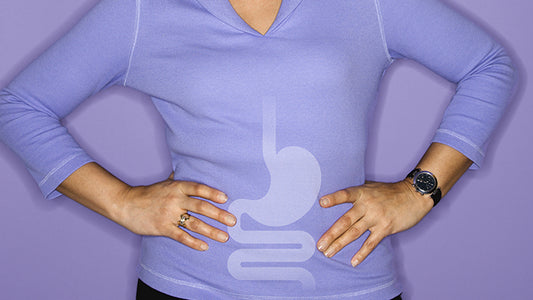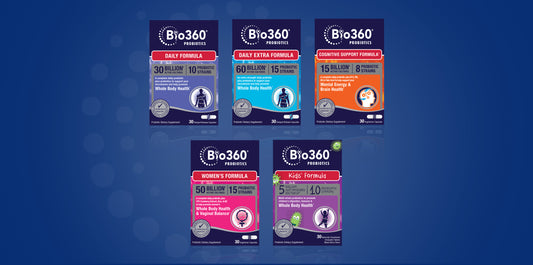
Probiotics for Women's Health & Happiness
 by Dr. Émilie Desfossés-Foucault, Scientific Advisor
by Dr. Émilie Desfossés-Foucault, Scientific Advisor
Dr. Émilie Desfossés-Foucault is a microbiologist with a PhD in Food Science. She has postdoctoral training in the probiotic field and has extensive knowledge in food microbiology, probiotics, molecular biology, fermentation, and is also trained as a cheesemaker.
Probiotics For Women's Health & Happiness
Probiotics are naturally occurring in the gut but can be weakened by prolonged stress, a high-sugar or high-fat diet, insomnia, antibiotic use, smoking, overexercising, and excessive alcohol use. Why does that matter? Well, research shows us that the lower and weaker our "good bacteria" are, the greater the risk for our body.*
What are probiotics? Probiotics—found in supplements or foods like yogurt, kefir, and kimchi—are live microorganisms that replenish and nourish these "good bacteria" in our guts. These beneficial intestinal bacteria have important functions, such as producing various nutrients for their host, protecting against intestinal pathogens, and modulating a normal immunological response.*¹
Benefits of Women's Health Probiotics
Not all probiotics are alike. Studies indicate that health benefits are strain specific. For instance, a woman's urogenital balance can benefit from a boost of bacterial species, such as Lactobacillus jensenii and Lactobacillus gasseri.*
Like your digestive tract, the vaginal environment is teeming with beneficial bacteria and other microorganisms. It is naturally acidic, which helps create a hostile environment for infectious bacteria. Unfortunately, life events like stress, diet, medications, menstruation, and pregnancy can offset the balance of good bacteria in a woman's microbiome. The use of antibiotics, spermicides, and birth control pills can also throw the area out of balance.
Conditions That Women's Probiotics Address
A women's-specific blend of probiotics—ones that contain Lactobacilli, specifically—can provide a host of benefits.*
Probiotics Supporting Vaginal Health*
A healthy vagina should contain high levels of Lactobacillus, along with some Bifidobacteria. Bacterial imbalances may lead to issues for women, including thrush (fungal yeast infections caused by an overgrowth of Candida), bacterial vaginosis (BV), vaginal dryness, and urinary tract infections (UTI).
According to the Centers for Disease Control and Prevention (CDCP), more than one billion women around the world suffer from non-sexually transmitted urogenital infections, such as bacterial vaginosis, urinary tract infection, and several other yeast infections.²
These infections are not always a one-time occurrence, either. While 75% of women will experience thrush at least once in their lifetime, more than 40% of women will experience these yeast infections three or more times in their life. Meanwhile, 84% of women will have bacterial vaginosis in their lifetime, and 50% of those women experience more than one occurrence.³
Based on the bacteria found in the vagina of a healthy premenopausal woman, studies have been carried out using a combination of Lactobacillus plantarum, Lactobacillus rhamnosus and Bifidobacterium lactis (a total 15 billion bacteria), to assess the impact of these bacteria strains on thrush and BV.*
One such study reported that 95% of women who used a supplement containing L. plantarum, L. rhamnosus and B. lactis reported relief from itching, burning, discharge, and dryness.⁴
One in three women will experience vaginal dryness at some time in their life.³ Oftentimes, menopause will produce vaginal dryness due to the decrease of estrogen (a major hormone involved in the menstrual cycle) that promotes vaginal lubrication. Without lubrication, a bacteria imbalance can occur, leading to infection.
For urinary tract infections, refer to your physician for the best treatment. However, probiotics can help support vaginal health in two ways: to help support a healthy urinary tract, and as an effective way to colonize and protect the vagina.*
Probiotics for Pre- & Post-Natal Health*
Hormonal fluctuations during and after pregnancy can also trigger yeast infections. In fact, up to 75% of pregnant women will experience thrush in their last trimester.³
Fortunately, probiotic use can help support recalibrate a normal balance of vaginal flora.* Before adding probiotic supplementation to your diet, it is important to discuss any supplementation during pregnancy with your physician or gynecologist (OB/GYN).** When choosing the right probiotic supplement during pregnancy and beyond, make sure it is safe, supports your intimate health, promotes digestive health, and assists with immune health.** Three specific strains—Lactobacillus plantarum, Lactobacillus reuteri, and Lactobacillus fermentum—have been proven to be safe during pregnancy, and L. fermentum has been shown to enhance the health of expectant mothers.**⁵
Best Probiotics Strains For Women
As previously mentioned, the best strains for women to promote vaginal bacterial balance are Lactobacillus jensenii and Lactobacillus gasseri.*
Bio360® Women's Formula contains both, along with science-backed recipe of 360FIVE™ 5-strain blend of Lactobacillus rhamnosus GG, Lactobacillus plantarum, Bifidobacterium animalis subsp. lactis, Lactobacillus fermentum and Lactobacillus paracasei to benefit digestive and immune health.*
For all-in-one convenience, Bio360® Women's Formula adds a boost of cranberry extract to help support a healthy urinary tract, Zinc to support immune system function, and B12 to help convert food into fuel for physical energy.*
Looking to learn more about probiotics? Check our blog post Probiotics & The Immune System for more information.
1. Paulina Markowiak and Katarzyna Śliżewska, Effects of Probiotics, Prebiotics, and Synbiotics on Human Health, September 2017.
2. Waigankar SS, Patel V. Role of probiotics in urogenital healthcare. J Midlife Health. 2011. 2:5e10.
3. Logan J, Supporting intimate health and a healthy pregnancy. Women's Health. Book 18.
4. Mezzasalma V, Manfrini E, Ferri E, Boccarusso M, Gennaro P, Schiano I, Michelotti A, Labra M. Orally administered multispecies probiotic formulations to prevent uro-genital infections: a randomized placebo-controlled pilot study. Arch Gynecol Obstat. 2016. DOI: 10.1007/s00404-016-4235-2
5. Anukam KC, Osazuwa E, Reid G. Improved Appetite of Pregnant Rats and Increased Birth Weight of Newborns Following Feeding with Probiotic Lactobacillus rhamnosus GR-1 and Lactobacillus fermentum RC-14. The Journal of Applied Research. 2005; 5:46–52.
**If you are pregnant, breastfeeding, taking any prescription, medication or have a medical condition, consult your healthcare professional before taking this product.



